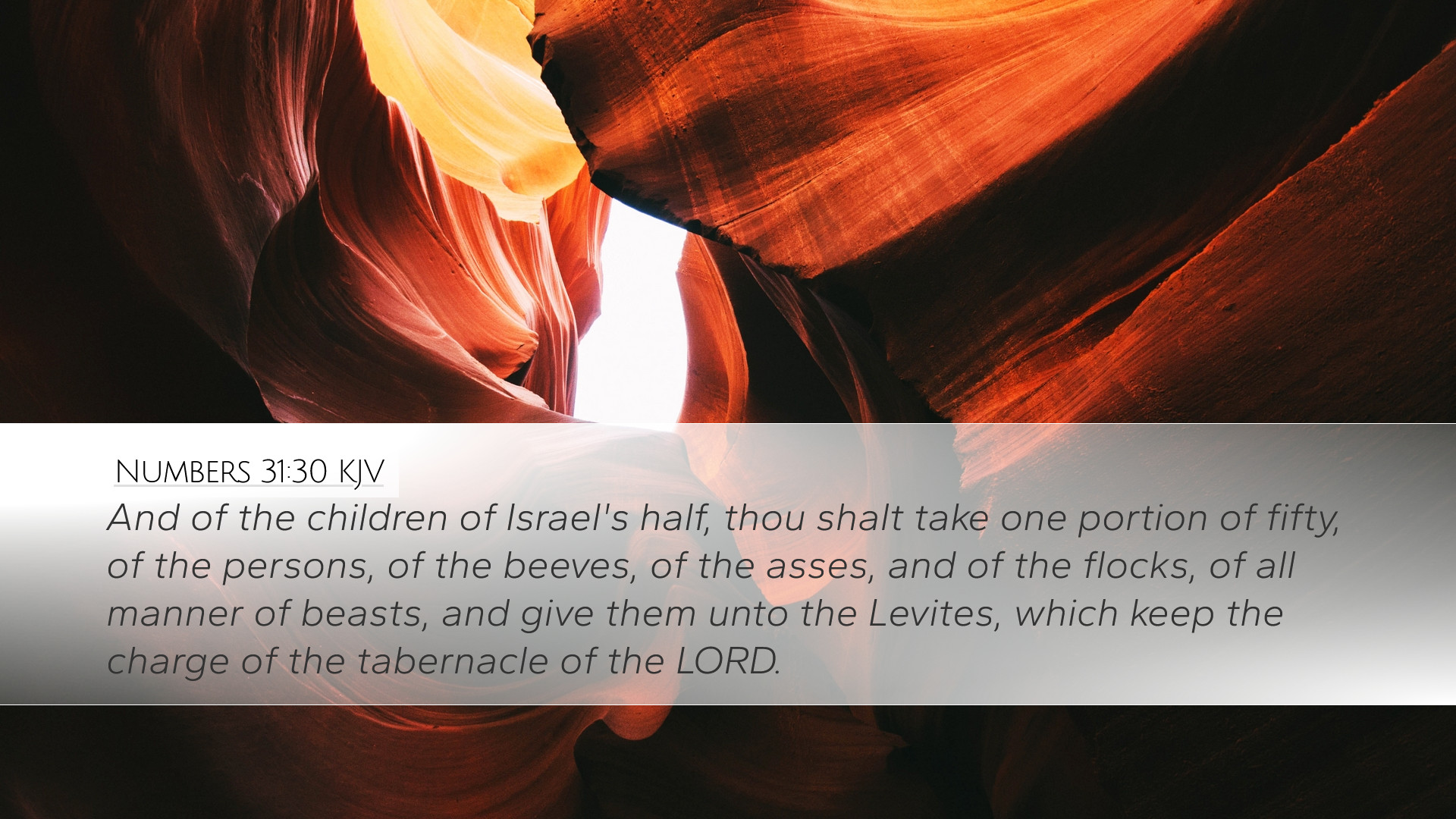Commentary on Numbers 31:30
Bible Verse: Numbers 31:30 - "And of the children of Israel's half, thou shalt take one portion of fifty, of the persons, of the oxen, of the asses, and of the sheep, of all manner of beasts, and give them unto the Levites, which keep the charge of the tabernacle of the LORD."
Introduction
This passage from Numbers 31:30 occurs within the context of Israel's military victory over the Midianites. God commanded Moses to take a census and to collect the spoils of war, which included livestock and captives. The instructions in this passage highlight the sacred responsibility of distribution, especially concerning the Levites, who served in the tabernacle of the Lord. In this commentary, insights from Matthew Henry, Albert Barnes, and Adam Clarke will enrich our understanding of this scripture.
Contextual Analysis
Numbers 31 discusses the culmination of Israel's conflict with the Midianites and the significance of dedicating a portion of these spoils to the Levites. This practice emphasizes God's provision for His servants and the essential role the Levites played in maintaining Israel's worship and sacrificial system.
Military Context
Henry notes that this war was prompted by the Midianite's seduction of Israel into idolatry and immorality. The military engagement was not merely about physical conquest but was deeply woven into the fabric of Israel's covenant relationship with God. Moses' instruction reflects God's just governance over the spoils, establishing equity among the people.
Role of the Levites
Albert Barnes highlights the unique standing of the Levites, who were designated to serve the Lord. The instruction to give a portion of the spoils to them underscores their essential ministry in Israel. It shows that although the Levites did not partake in military exploits, they were integral in preserving the spiritual state of the nation. The offering to the Levites demonstrates an acknowledgment of their services, reminding Israel that their victory was not solely through human efforts but through divine favor.
Distribution Principles
Adam Clarke provides meaningful insights into the detailed instructions regarding the distribution of the spoils. The command to take a portion indicates God’s order in the allocation of resources. This was a legal and moral obligation, assuring that all aspects of Israel's national life, including worship, were adequately supported. The concept of everyone sharing in God's blessings, including those who serve in spiritual capacities, reinforces the importance of community and shared responsibility.
Theological Implications
This verse encapsulates broader theological themes relevant to pastors, students, and scholars:
- God's Provision: The distribution of resources reflects God's providential care for His people, ensuring that all needs, including spiritual, are met.
- Justice and Equity: The structured approach to the spoils indicates a divine principle of fairness and justice within the community. Leaders are responsible for the welfare of all members.
- The Role of Ministry: The Levites represent the indispensable role of spiritual leaders within the congregation, highlighting their need for support from the community.
Practical Applications
Reflecting on Numbers 31:30, contemporary applications emerge for today’s church leaders and congregations:
- Support for Ministry: Churches should ensure that pastoral staff and ministry leaders are sufficiently supported, recognizing the commitment they make to lead spiritually.
- Community Responsibility: Believers are called to take responsibility for one another’s needs, especially those who serve sacrificially within the community.
- Sacredness of Service: Elevating the perception of spiritual service encourages a culture of honor, esteem, and recognition for those dedicated to God’s work.
Conclusion
Numbers 31:30 serves as a poignant reminder of the interconnectedness of community responsibility, spiritual leadership, and divine provision. The insights of esteemed commentators such as Matthew Henry, Albert Barnes, and Adam Clarke reinforce this message, showcasing the depth of God's design in the life of His people. As we reflect on this passage, it is crucial for all believers to appreciate the spiritual dynamics at play and to act in accordance with God’s principles of provision and support for His servants.


